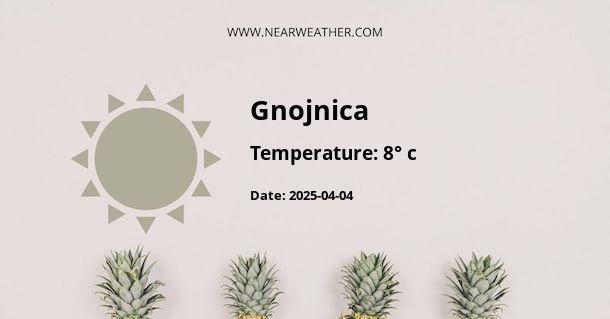Overview of Gnojnica's Geographical Location
Gnojnica is a small settlement that is situated in Bosnia and Herzegovina. Known for its picturesque landscapes and historically rich surroundings, the area's climate is influenced by a mix of continental and Mediterranean climate patterns, which renders its weather quite unique.
Understanding Gnojnica's Climate
The climate in Gnojnica is classified as a humid continental climate, according to the Köppen climate classification system. This denotes warm to hot summers and cold winters, with a significant temperature variation between these seasons. Due to its geographic position in Southeast Europe and the influence of both the Adriatic Sea and the Dinaric Alps, Gnojnica experiences a blend of maritime and continental weather patterns.
Seasonal Climate Patterns
Spring
Spring in Gnojnica typically begins in March and ends in May. During this season, the weather begins to warm up gradually.
- March: The temperatures in March can be quite variable, with an average low of around 2°C and average highs around 10°C. Precipitation starts to increase, signaling the end of the winter season.
- April: By April, the temperature consistently warms, with average lows around 6°C and highs near 15°C. April showers are common, contributing to the blossom of local flora.
- May: May is the lead-up to summer, with warmer conditions. Average lows may hover around 10°C, with highs often reaching 20°C. However, late spring can still be subject to occasional rainfalls.
Summer
Summers are usually warm and pleasant, starting in June and ending in August.
"Gnojnica's summers provide an ideal climate for outdoor activities with long, warm days that are rarely oppressively hot." - Gnojnica Weather Bureau
- June: The onset of summer sees average temperatures ranging from lows of 14°C to highs around 25°C. Rainfall diminishes slightly, though sporadic thunderstorms can occur.
- July: This is typically the warmest month, with average low temperatures of 16°C and highs that can exceed 27°C. Humidity levels can rise, adding to the sensation of heat.
- August: Similar to July, August maintains high temperatures with a slight increase in rainfall, signaling the eventual transition to autumn.
Autumn
Autumn manifests itself from September to November, with temperatures gradually cooling down.
- September: The beginning of autumn sees average lows of around 11°C and highs of 21°C. Precipitation increases, leading to a more humid climate.
- October: Average temperatures drop to lows of 6°C and highs of 15°C. October marks the onset of the crisp, cooler weather of late autumn.
- November: A noticeable dip in temperature occurs, with lows around 3°C and highs barely reaching 10°C. Rainfall continues and can transition to snow as winter approaches.
Winter
Winter, extending from December through February, brings the coldest weather of the year to Gnojnica.
- December: As winter sets in, average temperatures range from lows of -1°C to highs of 5°C. Snowfall becomes more common, blanketing the landscape in white.
- January: The coldest month of the year sees average lows around -3°C and highs near 3°C. Snow and frost can be persistent, with occasional periods of thawing.
- February: In February, there is often still a chill in the air, with similar conditions to January. The end of the month may start showing the first signs of the forthcoming spring.
Year-Round Weather Phenomena
Gnojnica, like other regions in Bosnia and Herzegovina, can experience weather phenomena that are typical for the area:
- Fog: Due to its geographical location in a valley surrounded by mountains, Gnojnica can be prone to fog, particularly in the winter months.
- Wind: Local wind patterns, including the Bora (a dry, cold downslope wind), can influence temperature and precipitation.
- Thunderstorms: In the summer, the heat can occasionally trigger thunderstorms, which are usually short-lived but can be intense.
Yearly Averages and Records
| Month | Average Low (°C) | Average High (°C) | Precipitation (mm) |
|---|---|---|---|
| January | -3 | 3 | 70 |
| February | -3 | 5 | 65 |
| March | 2 | 10 | 60 |
| April | 6 | 15 | 75 |
| May | 10 | 20 | 85 |
| June | 14 | 25 | 90 |
| July | 16 | 27 | 80 |
| August | 16 | 27 | 85 |
| September | 11 | 21 | 95 |
| October | 6 | 15 | 80 |
| November | 3 | 10 | 85 |
| December | -1 | 5 | 75 |
Note: The data above represents average values gathered over several years and can vary from year to year.
Adapting to Gnojnica's Climate
Those looking to visit or move to Gnojnica should consider the substantial seasonal variations when planning activities or deciding on the best time to explore the region. For outdoor enthusiasts, the best times are typically late spring through early autumn, when the climate is most favorable for hiking, sightseeing, and engaging in various outdoor adventures.
Understanding Gnojnica's unique weather patterns is not only fascinating for climate enthusiasts but also essential for the local agriculture, which relies on precise weather predictions for successful crop harvesting and management.
In conclusion, Gnojnica's climate offers a rich tapestry of weather experiences throughout the year, each with its own charm and challenges. Whether you are admiring the snowy mountain peaks in winter or enjoying the lush greenery and warm sun in summer, Gnojnica has a weather pattern that caters to a wide array of preferences and activities.
A - Gnojnica's Latitude is 44.620560 & Longitude is 18.446671.
A - Weather in Gnojnica is 8° today.
A - Climate Conditions in Gnojnica shows overcast clouds today.
A - Humidity in Gnojnica is 92% today.
A - Wind speed in Gnojnica is 1.94 km/h, flowing at 239° wind direction. today.
